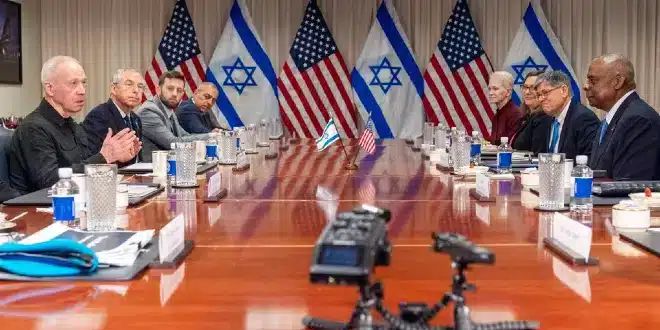Negotiations have resumed to schedule a visit by high-ranking Israeli figures to Washington for discussions on potential military actions in Gaza, following Israeli Prime Minister Benjamin Netanyahu’s decision to cancel his own trip due to displeasure with the U.S. abstaining on a U.N. resolution calling for a ceasefire. The White House, through press secretary Karine Jean-Pierre, confirmed efforts are underway to arrange a new meeting date suitable for both parties.
Although no specific date has been set, it’s been indicated that Ron Dermer, Israel’s strategic affairs minister, and Tzachi Hanegbi, the national security adviser, are expected to be part of the visiting team. These plans come amidst sensitive talks, with officials speaking under the condition of anonymity due to the delicacy of the situation.
The initiative for this renewed meeting effort came from the White House, aiming to schedule another session after the initial plan was scrapped by Netanyahu. He had cancelled the visit in reaction to the U.N.’s call for a ceasefire in Gaza, a motion the U.S. chose not to veto but abstained from voting on. Netanyahu criticized this move as a step back from a firm stance, especially since the ceasefire did not include provisions for the release of hostages held by Hamas.
The discussion in the U.S. was to focus on a proposed ground assault on Rafah in southern Gaza, a city currently overwhelmed with displaced people. Despite the U.S. urging against this operation, Israel has maintained its stance.
Israeli Defense Minister Yoav Gallant, who was already in Washington when the decision to cancel the visit was made, met with top U.S. officials, including Jake Sullivan, Antony Blinken, and Lloyd Austin, to discuss the Gaza operation among other subjects.
Netanyahu’s cancellation is seen as a strategic move to signal to Hamas that international pressure will not force Israel to conclude the war without achieving its objectives, including the dismantlement of Hamas’ military and governance structures and the release of hostages taken in the attack on Israel on October 7.
This cancellation, coupled with the U.S.’s abstention from the U.N. vote, marks one of the most significant public disagreements between the U.S. and Israel since the onset of the Gaza conflict.


